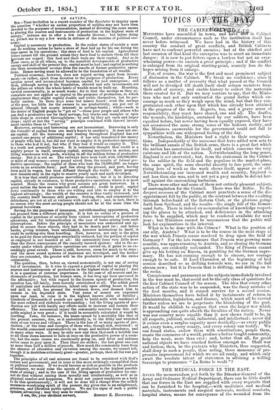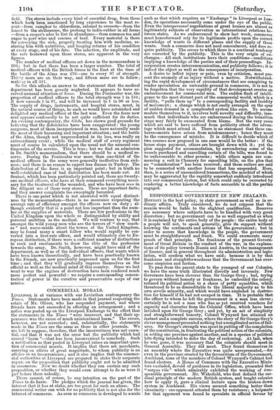THE MEDICAL FORCE IN THE EAST.
AFTER the memorandum put forth by the Director-General of the Army and Ordnance Medical Department, there can be little doubt that our forces in the East are supplied with every requisite that can be furnished to the hospital,—with medicines and medical materials, instruments and surgical materials, medical comforts, hospital stores, means for conveyance of the wounded from the field. The( stores include every kind of essential drug, from those which have been sanctioned by long experience to the most re- cent—from camphor to chloroform, calomel to creosote—from the lancet to the stethoscope, the probang to india-rubber in all forms —from a cooper's adze to lint in abundance—from common tea and sugar to port wine and essence of beef. Every material is there for conveying the sick, properly treating him with medicine, re- storing him with nutritives, and keeping returns of his condition at every stage, and of his fate. The selection, the amplitude, and the care bestowed upon these stores, are apparent in the very figures.
The number of medical officers set down in the memorandum is 205; but in fact there has been a larger number. The total of medical officers with the British forces in the East at the time of the battle of the Alma was 276—one to every 97 of strength. Thirty more are on their way, and fifteen more are to follow; making in all 311.
So far this affords an answer to the statement that the medical department has been grossly neglected. It appears to have re- ceived unusual attention at home. During the Peninsular war, the proportion of medical officers to the total strength was 1 in 154; it now exceeds 1 in 97, and will be increased to 1 in 90 or less. The supply of drugs, instruments, and hospital stores, must, in the natural course of things, be such as would have astonished and delighted any medical officer at the last war. Even the force now sent appears confessedly to be not quite sufficient for its duties. An evening contemporary, the Globe, has shown good grounds for believing that the deficiencies have been exaggerated : the young surgeons, most of them inexperienced in war, have naturally made the most of their harassing and important situation; and the battle of the Alma, though not unprecedented in its loss, was really an extraordinary event ; while the medical staff of every regiment must of course be calculated upon the usual not the unusual con- tingencies of the service. This is true ; but we find an admission in Dr. Smith's memorandum, that there should be a medical re- serve. During the Peninsular war more than one-third of the medical officers in the army were generally ineffective from sick- ness; and there is no reason to expect less disease in Turkey. The distribution of the force is an important point; but in truth no well-established case of bad distribution has been made out. At Scutari, which has been particularly pointed out, there are twenty- one medical officers, who have at their command everything neces- sary for the treatment of the wounded, and who have been seen in the diligent use of those very stores. These are important facts; and they answer complaints too sweepingly hazarded. There is one point which is not answered with equal distinct- ness by the memorandum—there is no assurance respecting the average rate of efficiency amongst the officers now on duty ; al- though evidently that is a point not less important than the num- ber or the supplies of materials. There are few professions in the United Kingdom upon the whole so distinguished by ability and personal ambition as the medical. We will venture to say, that amongst the wild young men who are the terrors of "slow coach- es" and nurse-maids about the towns of the -United Kingdom, may be found many a smart fellow who would rapidly be con- verted into a first-rate officer, and would ultimately rise to Eu- ropean distinction, if there were a sufficient number of distinctions in rank and emoluments to draw the elite of the profession towards the army. Dr. Smith, however, might have said of the department, as well as of the individual officers, that wants which have been known theoretically, and have been practically known to the French, are now practically impressed upon us for the first time ; and that they will gradually, impress themselves on the official as well as the medical mind of this country. Since we last went to war the engines of destruction have been rendered much more perfect and powerful : we require a corresponding concen- tration of power in the curative and preservative corps of our armies.



























 Previous page
Previous page